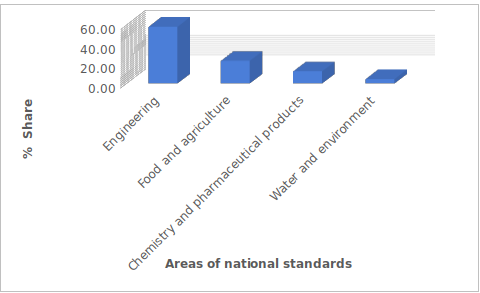The Management of NSD
Mr. GATERA Emmanuel
Ag. Division Manager
E-mail: emmanuel.gatera@rsb.gov.rw
Director of EUP Unit
Mr. KABANDA Eric
Ag. Director, EUP Unit
E-mail: eric.kabanda@rsb.gov.rw
Director of ACES Unit
Mr. UWIMANA RUBURA Modeste
Ag. Director, ACES unit
Email: modeste.uwimana@rsb.gov.rw
Director of SPTTA Unit
Mrs. KANYANGE Marlene
Director, SPTTA Unit
E-mail: marlene.kanyange@rsb.gov.rw
What is a standard?
A standard is a document, established by consensus and approved by a competent organ that provides, for common and repeated use, rules, guidelines or characteristics for activities or their results, aimed at the achievement of the optimum degree of order in a given context. National standards are standards approved by RSB, under Law N° 50/2013 of 28/06/2013.
Since 2002, more than 3,000 standards have been approved as Rwanda National Standards. Figure 1 shows the distribution of national standards in different areas where engineering accounts for about 60% of the approved national standards followed by food and agriculture with about 25% and, water and environment with 12%.

Figure 1: Distribution of national standards in different areas as of May 2022
What are the benefits of standards?
Standards have become such integral components of our economic, social and legal systems that they are frequently taken for granted and their crucial role in a modern society is often not recognized. The RSB Standards Division has unconquerable experience in its core function, namely, the development of national standards and maximizing the benefits of international standards through adoptions, which enhances the competitiveness of the Rwandan industry and advances international trade.
In Rwanda our standards enhance competitiveness and provide the basis for consumer protection, health and safety.
1. Benefits to consumers:
2. Benefits to SMEs:
3. Benefits to government:
4. Types of Standards
4.1. International and regional standards
International Standards reflect agreements on the technical description of the characteristics to be fulfilled by the product, system, service or object in question. They are widely adopted at the regional or national level and are applied by manufacturers, trade organizations, purchasers, consumers, testing laboratories, governments, regulators and other interested parties.
Since International Standards generally reflect the best experience of industry, researchers, consumers and regulators worldwide, and cover common needs in a variety of countries, they constitute one of the important bases for the removal of technical barriers to trade as recommended by the World Trade Organization (WTO) in its agreement on Technical Barrier to Trade (TBT).
4.2. Benefits of international standards
International Standards bring technological, economic and societal benefits. They help to harmonize technical specifications of products and services making industry more efficient and breaking down barriers to international trade. Conformity to international standards helps reassure consumers that products are safe, efficient and good for the environment.
For more information, click the link below:
www.iso.org/iso/home/standards/benefitsofstandards.htm
4.3. Cooperation
Rwanda Standards Board participates in regional and international standardization activities by taking part into standards setting and standards harmonization at regional and international levels. Participating into regional and international standardization activities has significant advantages to Rwanda, such as:
-
Influencing regional and international standards development process
-
Creating regional and international pathways and markets
-
Avoiding the waste of resource or “reinventing the wheel”
4.3.1. Regional cooperation
At regional level, Rwanda Standards Board has cooperation with the following organizations:
4.3.2. International cooperation
At international level, Rwanda Standards Board has cooperation with the following organizations:
4.3.3 National Standards Bodies
Rwanda Standards Board has entered into cooperation with other national standards bodies (NSBs)
